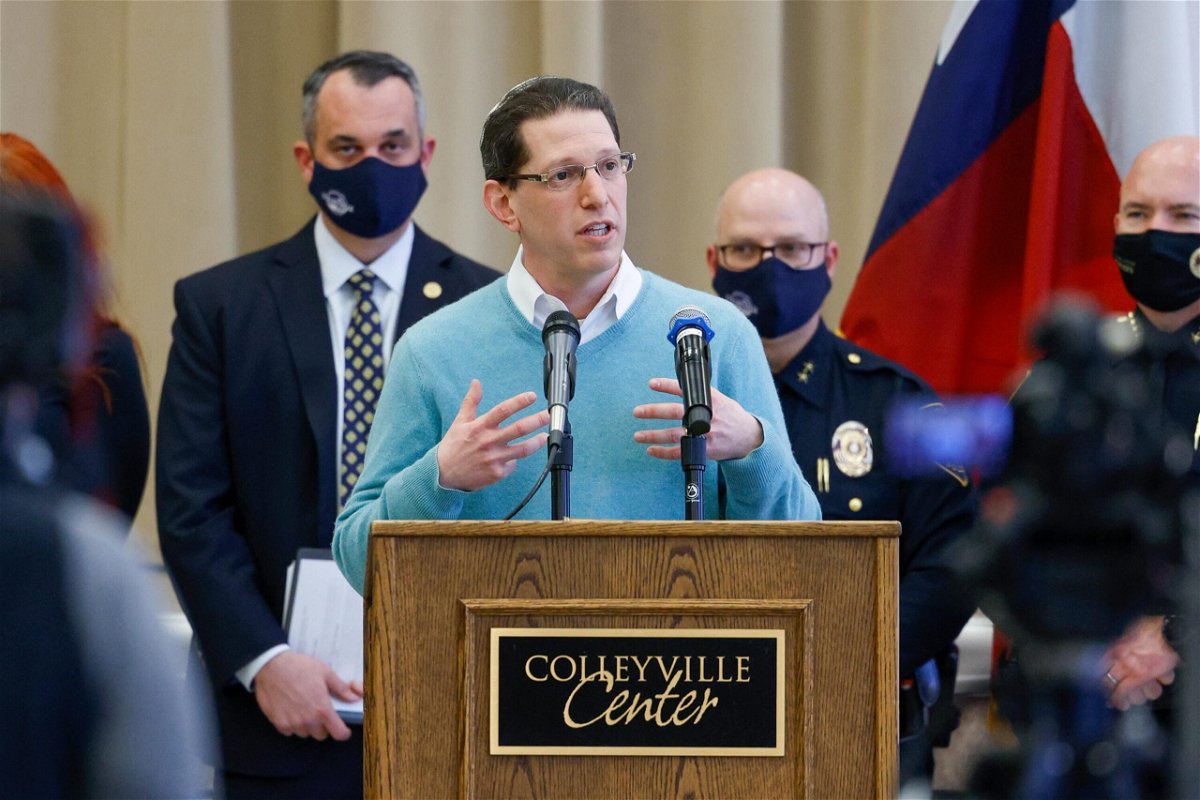Rabbi tells lawmakers about hostage ordeal and calls for more funding for security

Rabbi Charlie Cytron-Walker of Congregation Beth Israel addresses reporters during a news conference at Colleyville Center on January 21 in Colleyville
By Geneva Sands, CNN
The rabbi who escaped a hostage takeover at his synagogue last month testified before Congress for the first time on Tuesday about his ordeal, detailing why he opened the door for the attacker and how he and others were able to flee after the hours-long standoff.
On the morning of January 15 when the gunman arrived, Rabbi Charlie Cytron-Walker of the Congregation Beth Israel in Colleyville, Texas, was running late, finishing preparations for the Torah reading, organizing the online setup and checking sound, he told a House Homeland Security panel.
“And in the midst of trying to do a million different things, I had a stranger come to the door,” he said. “I have of course thought about that moment a great deal. I welcomed the terrorist into my congregation. I live with that responsibility.”
Cytron-Walker said that despite being distracted that morning, he still did a visual inspection of the would-be-assailant, later identified as Malik Faisal Akram, a 44-year-old British national.
“(H)e appeared to be who he said he was — a guy who spent a night outside in sub-40 degree weather,” Cytron-Walker said.
The rabbi also spent time with Akram, serving him tea and talking to him to see if there were any red flags.
“I didn’t see any. Of course, I was wrong,” he said.
Cytron-Walker said he took all of these steps, combining hospitality and security, due to years of security training he received, including federally and locally managed courses.
Six years ago, he attended a faith-based security summit hosted by the FBI, Department of Homeland Security and the regional US Attorney’s Office. It was his first education related to active shooters, and the first time he was introduced the concept of the security committee for the synagogue.
His congregation was also the recipient of the Nonprofit Security Grant Program, funding providing through the Department of Homeland Security for nonprofits, such as religious institutions, to make security upgrades.
Cytron-Walker, in part, credited security plans, funding and courses with helping keep him and the other hostages alive that day. He previously told CNN that he waited for the right moment before throwing a chair at the assailant.
“(R)ight now, there are far too many houses of worship that are just beginning the process we started six years ago,” he said.
Cytron-Walker and others testifying Tuesday called for additional federal security funding for nonprofits and religious institutions, as well as changes to the way funding is currently implemented and doled out.
The “gap between the need and funding is profound,” he said, noting specific needs of small congregations.
In the wake of the hostage incident, the Nonprofit Security Grant Program has come under scrutiny for inadequate funding. In 2021, fewer than half of Nonprofit Security Grant Program applications were approved, he said.
Funding is “not at a level where it can meet the urgent needs of the communities it was created to protect,” Cytron-Walker said Tuesday.
Homeland Security Secretary Alejandro Mayorkas has asked for a “significant enhancement” in the funding allocated for the program, a DHS official said Monday.
On Monday, DHS updated the national terrorism bulletin, which says that the recent attack on the synagogue “highlights the continuing threat of violence based upon racial or religious motivations,” as well as threats against churches, synagogues and mosques.
Cytron-Walker also called on the federal government to lower the barriers for smaller congregations to apply to the program, perhaps providing shorter forms, and said it is his understanding that if an institution does not receive the grants, there’s no indication of where their application fell short.
Eric Fingerhut, president and CEO of the Jewish Federations of North America and a former member of Congress, testified that FEMA and the state administrative agencies struggle to keep up with the necessary administrative oversight and infrastructure of the program.
The agency also lacks the “statutory authority to fully respond to today’s increasingly complex, diffuse and dynamic threat landscape,” he said.
Michael Masters, national director and CEO of the Secure Community Network, agreed.
Demand for grant funds “far outpaces what is available,” he said, adding that “any additional funds Congress appropriates will allow us to protect more institutions and communities and this is critical.”
The-CNN-Wire
™ & © 2022 Cable News Network, Inc., a WarnerMedia Company. All rights reserved.